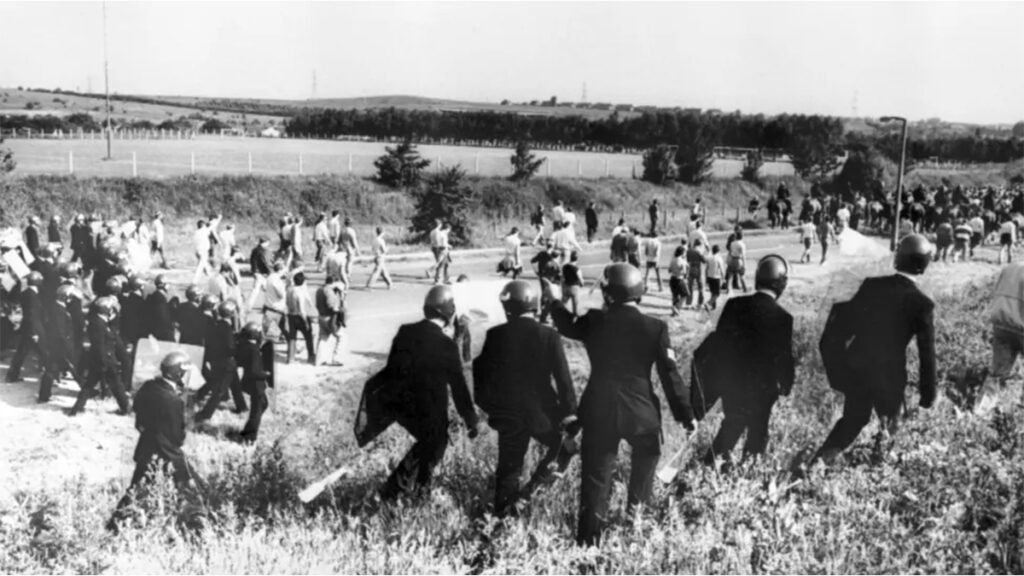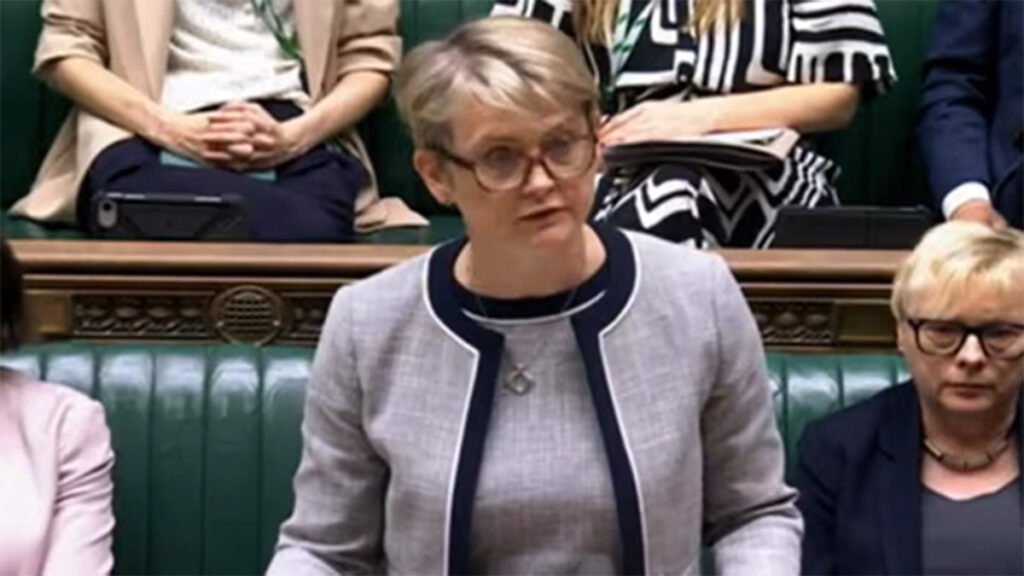When the state destroys evidence, it’s not incompetence, it’s policy.
Northumbria Police has just pulled off one of the most brazen acts of evidence destruction in recent British history, the force casually announcing they “disposed of” two boxes of crucial records pertaining to the Miners’ Strike and the infamous ‘Battle of Orgreave‘. This, of course, comes just as the long-awaited official inquiry into the violent confrontation that saw mounted police charge into crowds of striking miners forty years ago.
The force blithely confirmed that two boxes, brimming with data relating to the year-long strike and the violent confrontation at Orgreave in June 1984, were “disposed of” in April last year. That’s a mere 40-odd years after the events themselves, and with a staggering lack of irony, they insist this was “following a formal review, retain or disposal process in line with force policy and the Data Protection Act 2018.” One can almost hear the collective sigh of relief from anyone hoping to avoid accountability.
This isn’t bureaucratic housekeeping. This is institutional vandalism designed to protect the state from accountability. And it follows a well-worn playbook that’s as British as warm beer and chronic disappointment.
“Absolutely Alarming” – Or, Just Business As Usual?
Labour’s Ian Lavery, MP for Blyth & Ashington and himself a former miner, minced precisely zero words in the House of Commons on Thursday, branding the destruction “absolutely alarming.” “Is this the systematic attempt to obscure justice?” he demanded, “I’m not sure if anyone is prepared to ask that question.” He later hammered the point home: “Justice cannot be served if the evidence is systematically and deliberately destroyed.”
Lucy Powell MP, the Leader of the House of Commons, offered the sort of vaguely reassuring, utterly toothless response we’ve come to expect. She’d “continue to raise the issues with government ministers” and solemnly urged “anyone involved that they must retain the records and they must come forward.” One imagines the Northumbria Police records department, currently smelling faintly of burning paper, took that particular admonition to heart.
Meanwhile, the Orgreave Truth and Justice Campaign, who have fought for decades against institutional amnesia, understandably labelled the move “extremely disturbing.” Kate Flannery, their secretary, voiced the chilling fear: “We are now understandably worried about how many other police forces may have recently destroyed or intend to destroy important information that would be very relevant in an Orgreave inquiry or investigation.”
Justice Through the Shredder

The destruction of Orgreave records isn’t an isolated incident; it’s part of a systematic pattern where the British state protects itself from accountability by making accountability impossible. Every box of destroyed documents, every “misfiled” report, every “routine disposal” that happens just before an inquiry represents another nail in the coffin of justice.
For the miners of Orgreave, this isn’t about historical curiosity… it’s about vindication after forty years of being branded criminals for defending their livelihoods. It’s about exposing the lies told by police officers who committed perjury to cover their crimes. It’s about accountability for institutional violence that the state has spent four decades trying to forget.
But the state’s memory is remarkably selective. It remembers every unpaid council tax bill and parking fine, but somehow forgets every police baton charge and fabricated statement. It keeps detailed records of benefit claims and immigration status, but loses track of evidence documenting its own crimes.
The State’s Greatest Hits: A History of Convenient Amnesia

Britain’s establishment has a long history of turning the destruction of inconvenient evidence into an art form. The pattern is always the same: promise an inquiry, delay for decades, then mysteriously discover that crucial evidence has been “lost,” “destroyed,” or “misfiled” just when accountability threatens to bite.
Take Hillsborough, where it took 27 years for the truth to emerge about police lies and cover-ups that blamed Liverpool fans for their own deaths. Or the Bloody Sunday inquiry, which dragged on for 38 years while witnesses died and evidence conveniently disappeared. The Birmingham Six, the Guildford Four, the state’s response is always the same: delay, obfuscate, destroy, deny.
Perhaps most nauseating of all was Theresa May’s handling of the Westminster paedophile files when she was Home Secretary. More than 100 files concerning allegations of child abuse at the heart of Westminster were destroyed, while the crucial Geoffrey Dickens dossier, which named alleged paedophiles in government, was simply “not kept” after being handed to then Home Secretary Leon Brittan.
May’s response was a masterclass in establishment doublespeak. She admitted there “might have been” a cover-up at the Home Office in the 1980s, told MPs she “cannot stand here and say the Home Office was not involved in a cover-up,” then ordered the Wanless review which conveniently found that “shambolic” record keeping meant no definitive answer could be given either way.
Translation: We destroyed so much evidence that we can’t prove our own crimes, which somehow absolves us of responsibility for destroying the evidence. The perfect circular logic of institutional impunity ‘destroy the proof’, then claim the lack of proof proves innocence.
The establishment learned long ago that time is their greatest weapon. Keep inquiries running long enough, and witnesses die, memories fade, and evidence gets “routinely disposed of.” It’s not a bug in the system… It’s a feature.
Of course, we most definitely should not mention grooming gangs…
Orgreave: When the State Went to War on Working People
The Battle of Orgreave on June 18, 1984, wasn’t a clash between equal forces. It was a calculated police assault on striking miners, complete with mounted charges that looked more like medieval warfare than modern policing. Miners were beaten unconscious, arrested en masse, and charged with riot, charges that later collapsed when evidence emerged of police brutality and fabricated statements.
For forty years, those miners and their families have fought for justice, watching as successive governments promised inquiries that never materialised. Theresa May pledged a review in 2016, then abandoned it. Now, just as Labour commits to finally holding an inquiry, Northumbria Police decides April 2024 is the perfect time for a spring clean.
The timing isn’t coincidental; it’s criminal.
The Shredding Schedule: Destroying Evidence on Demand

Let’s examine the timeline that exposes this cover-up in all its cynical glory:
December 2016: Yvette Cooper, then Chair of the Home Affairs Committee, writes to police forces involved in Orgreave policing, specifically requesting information not already in the public domain. Northumbria’s Chief Constable Steve Ashman responds, confirming they hold 15 documents relating to the June 18, 1984 clashes and offering to make them available if requested.
2024: Labour includes an Orgreave inquiry commitment in their election manifesto.
April 2024: Northumbria Police “disposes of” two boxes of Miners’ Strike records in what they claim is routine data management following “formal review” processes.
Present day: Police claim this destruction followed “force policy and the Data Protection Act 2018.”
This isn’t routine disposal, it’s evidence destruction with plausible deniability. If these records were so unimportant, why did Chief Constable Ashman specifically offer them to Parliament in 2016? If they contained nothing significant, why destroy them just as an inquiry finally seemed possible?
As miner Kevin Horne, who was arrested at Orgreave, points out: “Any argument that documents and records were simply destroyed on the basis of time passed does not make sense given that Northumbria police had already kept the documents for nearly 40 years.”
Exactly. You don’t keep documents for four decades then suddenly discover they’re taking up too much space just as investigators come knocking.
The Data Protection Act: When Privacy Laws Become Destruction Tools
Northumbria Police’s claim that they destroyed evidence under the Data Protection Act 2018 is particularly nauseating. Data protection laws exist to protect citizens from institutional overreach, not to give institutions convenient excuses for destroying evidence of their crimes.
The Act specifically allows for retention of data where there’s a legitimate public interest, and few things serve the public interest more than investigating police violence against striking workers. But when the law becomes inconvenient, institutions simply reinterpret it to suit their needs.
This is the same police force that managed to keep these records safe through multiple reorganisations, budget cuts, and technological changes for forty years. Now, suddenly, they’re so concerned about data protection that they’re rushing to destroy historical records that could expose institutional wrongdoing.
The message is clear: the Data Protection Act protects institutions from scrutiny, not citizens from oppression.
The Domino Effect: How Many More Forces Are Shredding Evidence?
Kate Flannery from the Orgreave Truth and Justice Campaign raises the crucial question: “We are now understandably worried about how many other police forces may have recently destroyed or intend to destroy important information that would be very relevant in an Orgreave inquiry.”
She’s right to be worried. If Northumbria Police felt confident enough to publicly announce their evidence destruction, how many other forces are quietly doing the same? How many more boxes of inconvenient truths are being “disposed of” before investigators can examine them?
This isn’t just about Orgreave, it’s about establishing a precedent where institutions can destroy evidence of their crimes with impunity, as long as they invoke the right bureaucratic procedures and wait long enough.
Lucy Powell’s Hollow Words
In the House of Commons, Lucy Powell MP, Leader of the House, responded to concerns by saying people “must retain the records and they must come forward.” But the records are already gone, disposed of by the very institution she’s now asking to cooperate.
This is the establishment playbook in action: express concern about evidence destruction after the evidence has been destroyed, call for cooperation from institutions that have just demonstrated their commitment to obstruction, and promise action that will arrive decades too late to matter.
Powell’s response would be laughable if it weren’t so tragic for the miners and families still seeking justice.
The miners at Orgreave faced state terrorism in 1984. Today, their quest for justice faces institutional terrorism—the systematic destruction of evidence designed to ensure that truth remains buried and power remains unaccountable.
This is how British democracy really works: promise justice, delay endlessly, destroy evidence, claim innocence. The cycle repeats until everyone who cares is dead or too tired to fight.
But some fights are worth having, even when the deck is stacked, the evidence is shredded, and the system is rigged. Especially then.
Because if we don’t fight for justice for Orgreave, who will fight for justice for anything else? If institutions can destroy evidence with impunity, what’s to stop them destroying whatever evidence threatens them next?
The shredders are running, the files are disappearing, and time is running out. The destruction of these records isn’t just “alarming”; it’s a profound insult to justice, a slap in the face to those who suffered, and yet another damning indictment of a system that, when push comes to shove, consistently prioritises self-preservation over accountability.
The inquiry might proceed, but the truth, it seems, has just become significantly harder to unearth.
Support Independent Journalism Today
Our unwavering dedication is to provide you with unbiased news, diverse perspectives, and insightful opinions. We're on a mission to ensure that those in positions of power are held accountable for their actions, but we can't do it alone. Labour Heartlands is primarily funded by me, Paul Knaggs, and by the generous contributions of readers like you. Your donations keep us going and help us uphold the principles of independent journalism. Join us in our quest for truth, transparency, and accountability – donate today and be a part of our mission!
Like everyone else, we're facing challenges, and we need your help to stay online and continue providing crucial journalism. Every contribution, no matter how small, goes a long way in helping us thrive. By becoming one of our donors, you become a vital part of our mission to uncover the truth and uphold the values of democracy.
While we maintain our independence from political affiliations, we stand united against corruption, injustice, and the erosion of free speech, truth, and democracy. We believe in the power of accurate information in a democracy, and we consider facts non-negotiable.
Your support, no matter the amount, can make a significant impact. Together, we can make a difference and continue our journey toward a more informed and just society.
Thank you for supporting Labour Heartlands












